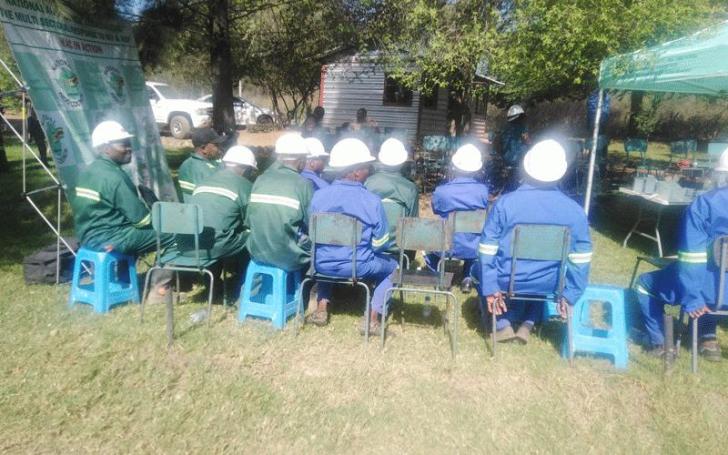News / Local
Huge drop in Matebeleland South HIV prevalence
04 Jun 2023 at 07:39hrs |
63 Views

Matebeleland South province is making considerable strides in combating HIV and Aids amid concerns that the province is characterised by high population movements.
The province shares borders with South Africa and Botswana. Beitbridge and Plumtree are entry points into the two countries respectively.
As such, there is high population movement and according to experts, mobility places individuals at great risk of HIV as well as onward transmission.
Data from the National Aids Council (NAC) shows that Matebeleland South's HIV prevalence rate is 17%, making it the highest in the country.
Outgoing NAC provincial manager for Matebeleland South Isaiah Abureni acknowledged that the province's HIV prevalence rate was high, but said significant strides have been made to combat HIV and Aids.
"When I joined NAC in 2004, the prevalence and incidence for HIV was very high," Abureni said.
"For example in 2011, the incidence was 0.88% which was pretty high, but as of 2022, it had gone down to 0.33%, which is a reduction of more than 50%.
"I am sure you are aware that Matebeleland South province has the highest prevalence in the country and in 2013 it was 23.5%, but currently it is around 17% which is still high.
"We are not so bothered about the prevalence, it just relates to the cumulative number of people living with HIV.
"Actually, if it decreases we become concerned because it means that people living with HIV are dying.
"We are saying the incidence is the one we are really concerned about if it increases and also for the prevalence."
However, Abureni said lately the prevalence was going down in tandem with the incidence.
Abureni said Matebeleland South has seven districts - Gwanda, Insiza, Beitbridge, Matobo, Bulilima, Mangwe and Umzingwane - which have their own unique drivers of HIV.
"We started by identifying hotspots where we believe transmission was high and these were nightclubs, brothels, truck inns and mines," he said.
"We also have artisanal miners mainly in Gwanda, Umzingwane and Insiza districts where there are a lot of gold deposits and we have young people there for gold who attract sex workers.
"So we are seeing a lot of sex workers moving around the province and they are patronising these gold-mining communities and we know that some of them might not use proper HIV prevention methods."
Abureni said due to the Plumtree and Beitbridge border posts, there was a lot of movement within the province.
Incoming NAC provincial manager Mgcini Sibanda said they have come up with a cocktail of intervention programmes that involve enlisting members of a specific at-risk group to influence and support members maintain healthy sexual behaviours, change risky sexual behaviours and modify norms in ways conducive to healthier lifestyles.
"Each ward or district has its own unique ways of dealing with HIV and we believe that a peer-led model would address the uniqueness of each ward or district," he said.
He said the intervention programmes embrace key populations.
The province shares borders with South Africa and Botswana. Beitbridge and Plumtree are entry points into the two countries respectively.
As such, there is high population movement and according to experts, mobility places individuals at great risk of HIV as well as onward transmission.
Data from the National Aids Council (NAC) shows that Matebeleland South's HIV prevalence rate is 17%, making it the highest in the country.
Outgoing NAC provincial manager for Matebeleland South Isaiah Abureni acknowledged that the province's HIV prevalence rate was high, but said significant strides have been made to combat HIV and Aids.
"When I joined NAC in 2004, the prevalence and incidence for HIV was very high," Abureni said.
"For example in 2011, the incidence was 0.88% which was pretty high, but as of 2022, it had gone down to 0.33%, which is a reduction of more than 50%.
"I am sure you are aware that Matebeleland South province has the highest prevalence in the country and in 2013 it was 23.5%, but currently it is around 17% which is still high.
"We are not so bothered about the prevalence, it just relates to the cumulative number of people living with HIV.
"Actually, if it decreases we become concerned because it means that people living with HIV are dying.
"We are saying the incidence is the one we are really concerned about if it increases and also for the prevalence."
However, Abureni said lately the prevalence was going down in tandem with the incidence.
Abureni said Matebeleland South has seven districts - Gwanda, Insiza, Beitbridge, Matobo, Bulilima, Mangwe and Umzingwane - which have their own unique drivers of HIV.
"We started by identifying hotspots where we believe transmission was high and these were nightclubs, brothels, truck inns and mines," he said.
"We also have artisanal miners mainly in Gwanda, Umzingwane and Insiza districts where there are a lot of gold deposits and we have young people there for gold who attract sex workers.
"So we are seeing a lot of sex workers moving around the province and they are patronising these gold-mining communities and we know that some of them might not use proper HIV prevention methods."
Abureni said due to the Plumtree and Beitbridge border posts, there was a lot of movement within the province.
Incoming NAC provincial manager Mgcini Sibanda said they have come up with a cocktail of intervention programmes that involve enlisting members of a specific at-risk group to influence and support members maintain healthy sexual behaviours, change risky sexual behaviours and modify norms in ways conducive to healthier lifestyles.
"Each ward or district has its own unique ways of dealing with HIV and we believe that a peer-led model would address the uniqueness of each ward or district," he said.
He said the intervention programmes embrace key populations.
Source - The Standard
Join the discussion
Loading comments…

































